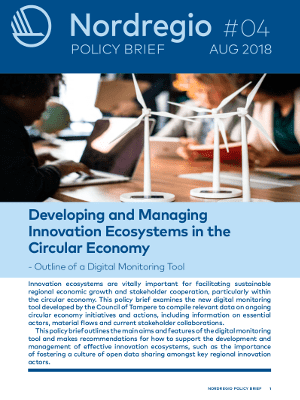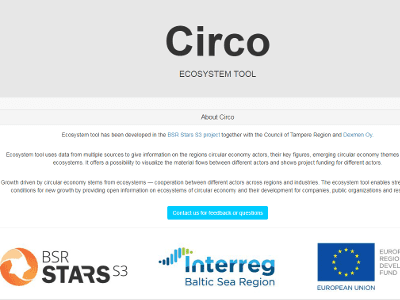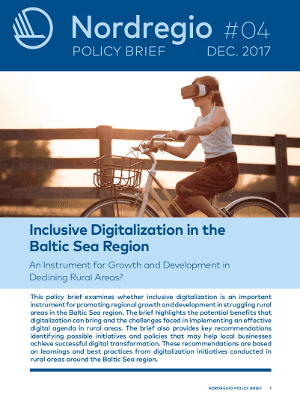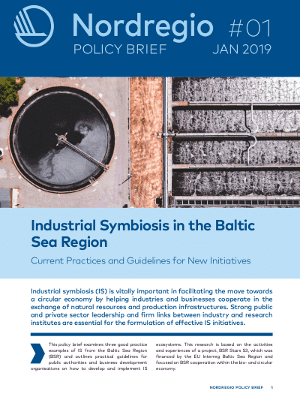BSR Stars S3
Smart specialisation (S3) is a systematic process to make European regions globally more competitive through innovation. This approach was introduced to policy makers as well as other stakeholders from business level, academia and other innovation actors in 2014. Since then, around 180 strategies were established. Even though many regions wanted to leverage their own strengths by connecting with regions in other countries, the existing structures, operational mechanisms and financing frames were not suited to these transnational ambitions.
Building on existing activities and policy governance structures, the project aimed to develop more integrated innovation support infrastructures, such as test and demonstration facilities and new innovation management tools to leverage complementary competences across borders in the Baltic Sea region. The project aimed to improve competences and capabilities of innovation actors to apply a transnational approach when they implement their regional and national smart specialisation strategies. The project focused on bio- and circular economy as a cross-sectoral priority field of smart specialisation in the Baltic Sea region with a focus on the Nordic states and Lithuania.
Budgets
in numbers
-
2.90MillionTotal
-
2.11MillionErdf
-
0.00MillionEni + Russia
-
0.07MillionNorway
Achievements
Administrative actors like regional and national public authorities from and beyond the partnership learned about economic opportunities in the bio- and circular economy and transnational cooperation. Regional authorities gained understanding on new digital potentials for innovation ecosystem management in their regions, e.g. by contributing and testing an online tool to visualise innovation ecosystems. Regional authorities also learned how to better organise workshops in cross-sectoral teams to find the best solutions to regional challenges by setting up so-called S3 accelerator camps. Beyond study visits, both regional authorities and business development organisations learned and tested ways to involve business sector and research organisations in smart specialisation, e.g. by organising matchmaking events and a so-called transnational innovation coaching.
Networking opportunities for bio- and circular economy stakeholders were organised in Karlstad, Tampere and Vilnius. The events have had altogether approximately 800 participants representing research (about 400 representatives), business (over 300 representatives), and the public sector (about 100 representatives). Another means of building further knowledge were so-called policy briefs on different topics. In policy briefs, the regions and research institutes summarised their learning about selected aspects of smart specialisation.
Outputs
Policy Brief: Innovation Ecosystems in the Circular Economy

Visualisation tool for circular economy innovation ecosystem

Policy Brief: Inclusive Digitalization

Policy Brief: Industrial Symbiosis

Project Stories
-
27.09.2021
Bio- and circular economy initiatives funded by the Baltic Sea Region Programme inspire
Transnational projects on bio- and circular economy funded by the current and earlier Interreg Baltic Sea Region Programmes are highlighted in the recent article published by the Baltic institute of Finland. They are taken as inspiring examples and good practices in the framework of the Smart Specialisation approaches.Read full story -
20.12.2016
How to stimulate BIO- & circular economy in the Baltic Sea Region
Innovations are always driven by demand. However, achieving an effective management and implementation of innovative solutions as part of regions’ smart specialisation strategies are not as simple as that. They require support from the public sector, strong backup in research and enterprises ready to take on the initiative.Read full story
Partners
The Baltic Institute of Finland
- TownTampere
- RegionPirkanmaa
- CountryFinland
- RepresentativeJohanna Leino
- Phone
- E-Mail
- Web
Nordic Council of Ministers
- TownCopenhagen
- RegionKøbenhavns omegn
- CountryDenmark
- RepresentativeAnnika Rosing
- Phone
- E-Mail
- Web
Business Link Greater Copenhagen
- TownKøbenhavn Ø
- RegionByen København
- CountryDenmark
- RepresentativeLars Albæk
- Phone
- E-Mail
- Web
The Swedish Agency for Economic and Regional Growth
- TownStockholm
- RegionStockholms län
- CountrySweden
- RepresentativeTony Backer-Meurke
- Phone
- E-Mail
- Web
Council of Tampere Region
- TownTampere
- RegionPirkanmaa
- CountryFinland
- RepresentativePetri Räsänen
- Phone
- E-Mail
- Web
MITA – Agency for Science, Innovation and Technology
- TownVilnius
- RegionVilniaus apskritis
- CountryLithuania
- RepresentativeSkaistė Budbergytė-Zabielaitė
- Phone
- E-Mail
- Web
Vilnius Gediminas Technical University
- TownVilnius
- RegionVilniaus apskritis
- CountryLithuania
- RepresentativeVilma Purienė
- Phone
- E-Mail
- Web
Lithuanian Innovation Centre (LIC)
- TownVilnius
- RegionVilniaus apskritis
- CountryLithuania
- RepresentativeMantas Vilys
- Phone
- E-Mail
- Web
Sør-Trøndelag County Authority
- TownTrondheim
- RegionSør-Trøndelag
- CountryNorway
- RepresentativePer Erik Sørås
- Phone
- E-Mail
- Web
Nordregio - Nordic Centre for Spatial Development
- TownStockholm
- RegionStockholms län
- CountrySweden
- RepresentativeJukka Teräs
- Phone
- E-Mail
- Web
Region Varmland
- TownKarlstad
- RegionVästmanlands län
- CountrySweden
- RepresentativeAnders Olsson
- Phone
- E-Mail
- Web
Region Västerbotten
- TownUmeå
- RegionVästerbottens län
- CountrySweden
- RepresentativeMarta Teclemariam Bahta
- Phone
- E-Mail
- Web
-
Project managerJohanna LeinoThe Baltic Institute of Finland
-
Legal representativeEsa KokkonenThe Baltic Institute of Finland
-
Financial managerLaura KarppinenBaltic Institute of Finland
-
Communication managerJohanna LeinoThe Baltic Institute of Finland



